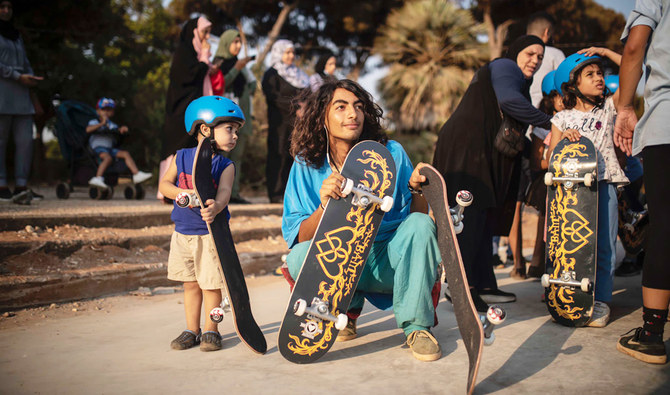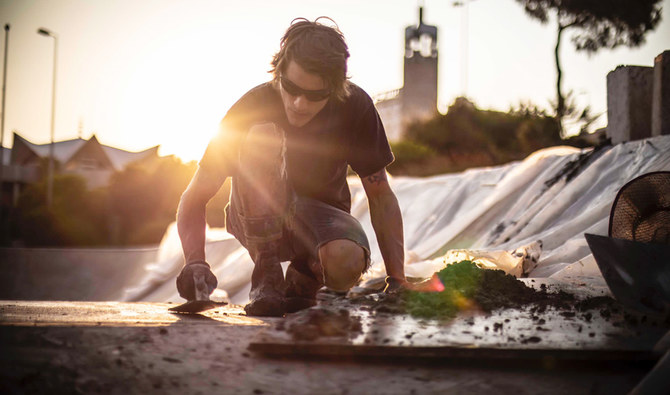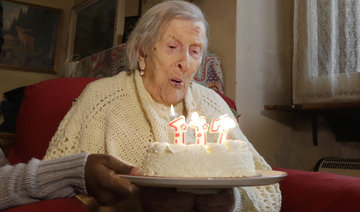DUBAI: Dany Sultan and Mike Richard have spent most of their adult life on skateboards.
While both young men embraced skating from a relatively young age, Lebanon has not always accepted them back. Up until now, the small Mediterranean country lacked a place to kickflip and grind; a place of inclusivity where people from different backgrounds could come together and work on their craft.
Instead, Sultan, 25 and Richard, 19, started most of their morning sessions scouting urban landscapes and public spaces in and around Beirut.
“We’d street skate anyplace that had a ledge, stairs or handrails,” Richard told Arab News.
For him and street skaters alike, run-ins with residents and security guards were common. Given the lack of a safe haven to skate, their discipline was viewed as a public nuisance.
“We’ve had a couple of issues with security guards and police,” Richard said, adding that he, along with some friends, were briefly detained late last year.
But being hard-wired with a high tolerance for fear and a sense of adventure helped them look past the altercations.
“For years we have reached out to municipalities to try and convince them to support (us) but we were always met with indifference and even resistance,” Sultan said.
Little did any of them know that a group of volunteers and donors would soon pave the way for the country’s first community skatepark in the heart of Beirut: Snoubar (Pine) Skatepark.
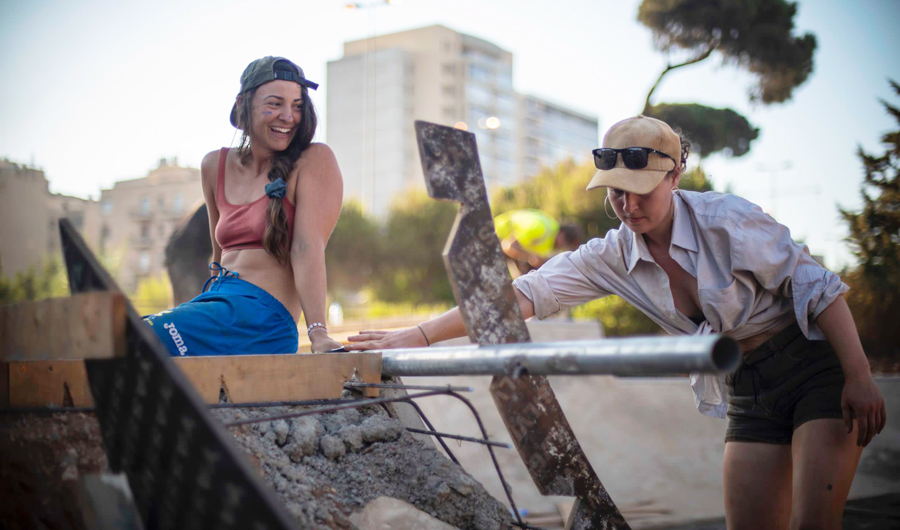
Local and foreign skaters, builders and volunteers worked on the construction site that typically included 20-25 people every day. (Supplied/Samantha Robison)
Twelve months ago, an explosion in Beirut’s port rocked the capital. Over 200 people were killed after a warehouse inadequately housing highly flammable chemicals caught fire.
As the tragedy made rounds across the globe, it caught the attention of INGO Make Life Skate Life (MLSL).
“My friend Arne Hillerns, who runs MLSL, reached out after seeing the blast on the news back in Brussels,” Esther Chang, a yoga instructor currently based in Beirut, told Arab News.
She, along with Arne and a local skater named Aida Mukharesh, put together a relief fund to support the local skaters with anything from hospital bills to rebuilding doors and windows, to even supporting a local skater’s tuition for a few semesters at university.
After also giving away over 80 skateboards with the support of skaters around the world, only one thing was left to do: Build an actual skatepark.
“There was still this dream of building a skatepark that the locals have had for decades,” Chang said.
Horsh Beirut, the Lebanese capital’s largest park and pine forest, would serve as the optimal location.
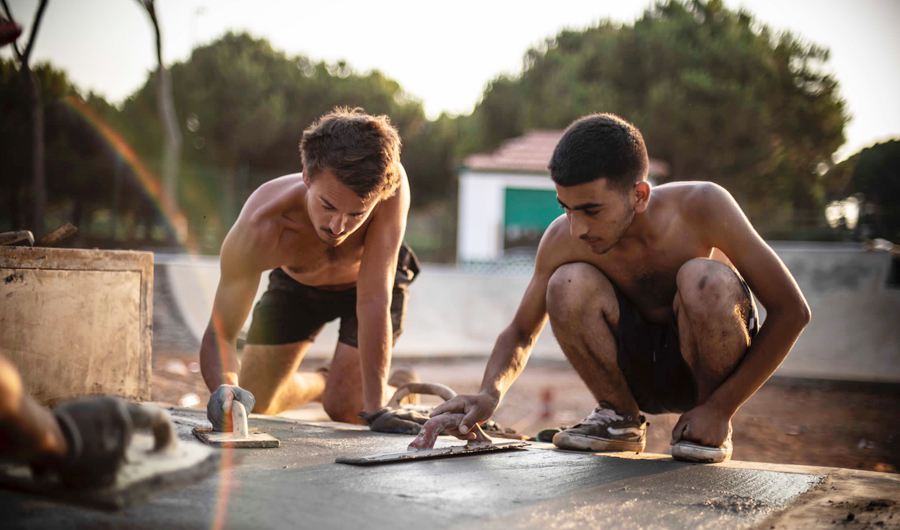
"Skateboarding is a sport that creates a strong communal sense," Sultan told Arab News. (Supplied/Samantha Robison)
“We pitched the idea to Beirut’s municipality — a free-of-charge and public skatepark in Beirut for youth — asked for some land, and to our surprise, they offered it to us,” Chang said.
To turn the dream into reality, a massive crowdfunding campaign was launched alongside donations from corporate and individual sponsors.
Axel A., a visual artist based in Dubai, auctioned off a customized skateboard. Decathlon, the French sports retailer, committed thousands of dollars.
“There was funding from a variety of sources including individuals as well as corporate sponsors such as the Decathlon Foundation, Air France and CHPO,” Samantha Robison, MLSL’s creative director, told Arab News.
The nonprofit has previously completed sustainable skateparks in India, Bolivia, Jordan, Myanmar, Ethiopia, Nepal, Morocco and Iraq with free on-site skateboarding, safety equipment loan systems and lessons with partner organizations.
“Local NGO arcenciel will help maintain and sustain the park while another NGO, Just Childhood, will create a program for free skateboarding lessons for the local youth in the neighboring Shatila Palestinian refugee camp,” Chang added.
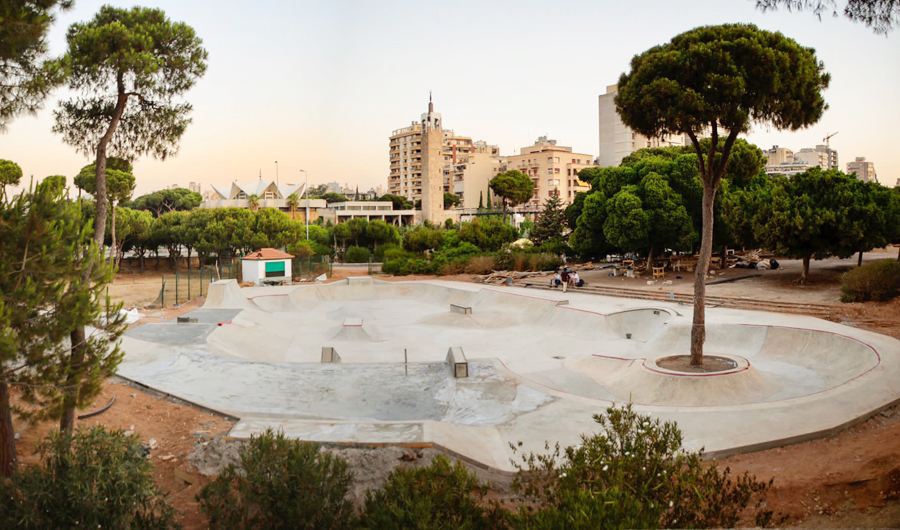
Since 2013, MLSL has constructed 10 skateparks that have positively impacted the lives of thousands. (Supplied/Samantha Robison)
“When Arne from MLSL contacted us to help build the first public, free skatepark in Beirut we were so excited to be part of it,” Jean-Philippe Rode, a skateboarder and product manager for Decathlon Skateboarding in France, told Arab News.
After gaining the financial support of the Decathlon Foundation, which forked out €50,000 ($59,352) in June, volunteers from across the world traveled to Beirut to take part in the project, coming from as far as Colombia, the US and Costa Rica.
The park was designed and constructed through the help of over 50 volunteers and local skaters alongside professional skatepark builders, who did “extremely taxing physical labor in the blazing hot sun, through stomach illnesses, dehydration and fatigue,” Robison and Chang noted.
“They have such an admirable dedication to spreading the love of skateboarding and helping build the skate community here in Lebanon,” Robison added.
One such volunteer was Dave Eassa, a lifelong skateboarder, visual artist and cultural worker from Baltimore in the US.
While serving as an artist in residence at Al-Raseef 153, a new arts space that is a part of the 7Hills skatepark and organization in Amman, Jordan, Eassa caught wind of the project during a conversation with 7Hills’ director.
“After speaking with Mohammed Zakaria (director of 7Hills) and German skater Matze, I bought a plane ticket at the last minute and headed to Beirut for 8 days to help with whatever I could,” Eassa said.
Matze, the skaters said, was the driving force behind the project. "The local skaters with the help of the fabulous Matze, who managed the project, brought us all to Lebanon," Robison said.
Skateboarding, Chang explained, has many intrinsic qualities beyond the sport itself. It has come a long way, breaking out of the fringes where it was regarded as counter-cultural, and propelling itself into the limelight by making its debut at the Tokyo Olympic Games this summer.
The skatepark, she said, will give youths a space to “gather, share ideas, and support each other in something they all have in common, skateboarding. No matter their age, gender, religion, they come together as skaters.”
Officially completed on Thursday, the park will give skaters like Sultan and Richard a place to safely spin down ramps and loop around a quarter pipe, away from any harassment.
The sense of community fostered during the build has been unmatched, the skaters said.
“It is truly a beautiful thing to see so many people coming together to volunteer their expertise, time and energy toward spreading the love of skateboarding,” Eassa said.
“Skateboarding has saved so many of us, giving us purpose in our lives, and created lifelong bonds and friendships across the globe so naturally it makes sense that so many of us wanted to give back to the existing and future generations of Lebanese skateboarders,” he added.
For the past year, Lebanon has faced a bevy of social, political and economic problems. Skyrocketing unemployment, inflation and rising food insecurity are only the tip of the crisis.
“For many, skateboarding represents a positive outlet of energy and emotions, which proves to be priceless in such a troubled and distressed country. In truly trying times, it is such an important outlet, a place to leave all the issues of the world behind even just for a little.” Eassa said.
“In the midst of so much chaos, people came together to create something beautiful and for one another,” Chang, who has been living in Beirut for over two years, said.
Yet Rode, like Eassa and the rest of the crew, will be back.
“There is no way you work on a skatepark and don’t skate it, so we’ll have to come back soon,” the 45-year-old skating aficionado said.


